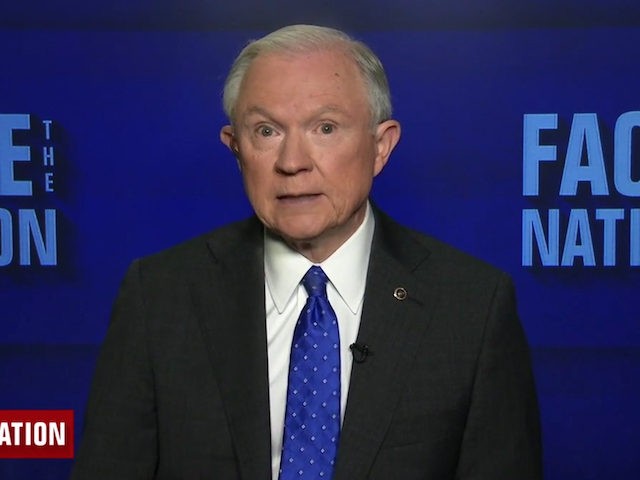Sunday on CBS’s “Face the Nation,” Sen. Jeff Sessions (R-AL) defended Republican presidential candidate Donald Trump policy proposal to have “extreme vetting” for those immigrating to the United States and said that those who should be admitted are those who “love America.”
Partial transcript as follows:
DICKERSON: Joining us now is Alabama Republican Senator Jeff Sessions. He is a key supporter of Donald Trump. Welcome, Senator. One of the things you have been helping Donald Trump with is his ideas on immigration. He’s going to speak about that this week. He met with some Hispanic leaders and said he’d like to find a humane and efficient way to deal with the 11 million or so undocumented workers in the United States. What does that mean to you, humane and efficient?
SEN. JEFF SESSIONS (R), ALABAMA: Well, I think, first and foremost, he has made clear that we end the illegality, we fix our border and secure it. That can be done with the president alone, really, if he had a determination to do so. And Congress could help make it even better. And then we will have to think about what is the right thing to do. He listened to a lot of people. I don’t think he made any commitments. He’s thinking that through. I think that is the right thing. But he is absolutely committed to the first thing that has to be done. And that’s end the lawlessness to protect Americans from danger and to protect American jobs from excessive flows of labor that pull down wages and job opportunities for Americans.
DICKERSON: As he’s articulated it in the primary, ending that lawlessness — and he’s talking about law and order now on the stump — ending that lawlessness means removing, soon after he’s president, the 11 million who are here from the country, enforcing the laws that they — he says they are breaking, removing them from the country, and then putting them at the back of the line. Is that your understanding, that that is still his position?
SESSIONS: Well, he’s wrestling with how to do that. People that are here unlawfully, that came into the country against our laws are subject to being removed. That’s just plain fact.
DICKERSON: Yes, there was a little confusion about his position. But you’re — you’re pretty certain where he is in terms of removing the 11 million from the United States?
SESSIONS: Well, what I’m certain about is that did he not make a firm commitment yesterday or at the meeting the other day about what he will do with that. But he did listen, and he’s talking about it.
DICKERSON: I want to ask you about — you mentioned security and those who are coming into the country. He’s talked a lot about extreme vetting for people who are coming into America. But a lot of these terrorist attacks, whether it’s in Chattanooga or Orlando or San Bernardino, were committed by people who are U.S. citizens. So, that wouldn’t be taken care of by the extreme vetting. You were involved with security discussions with the Trump campaign this week. What is the plan for dealing with those U.S. citizens who are participating in these terrorist acts?
SESSIONS: We had big group of national security experts presided over by Rudy Giuliani. And we — he listened intently to various ideas about this. But, look, second-generation, most of these were either first-generation refugee or immigrants or their children. So, it does increase the likelihood of an attack if you bring in more people from dangerous areas of the globe. American people clearly support an idea that if you can’t vet somebody from a dangerous area of the globe, they should not be brought into the United States. You don’t have a constitutional right to demand entry to the country. We should admit those who make America a better place, have a chance to flourish here and do well and love America.
DICKERSON: Well, those who are citizens presumably have that opportunity to flourish, but the vetting program won’t get at them. Donald Trump has suggested in the past some kind of a test for citizens. Was that discussed?
SESSIONS: Well, I don’t know that we discussed that in any detail, no. But the idea that you ask people about their understanding of what a good government is — if you have two people, one that wants to — believes in the democratic republic, like we have, one that has an ideology that wants to impose a narrow view of how the government should be run, a theocracy, then why would you not choose one who is most harmonious with our values? I think we can ask some of those questions. We have to be careful. We should talk to our lawyers and think it through carefully, but there’s no doubted that we can ask certain questions, as we have for decades, of people before they are admitted to our country.
DICKERSON: But what about people who are already here as U.S. citizens? How would the process work to ask them questions?
SESSIONS: Well, you can’t do that for a citizen. Once you get citizenship, you are just like anybody else. And you have every right of an American, no matter how you came here. Once you get that citizenship, you have equal rights of every American. But if you are applying to come, you, of course, can be evaluated differently.
DICKERSON: All right, Senator Jeff Sessions, thank you so much for being with us.
SESSIONS: Thank you.
Follow Pam Key on Twitter @pamkeyNEN

COMMENTS
Please let us know if you're having issues with commenting.